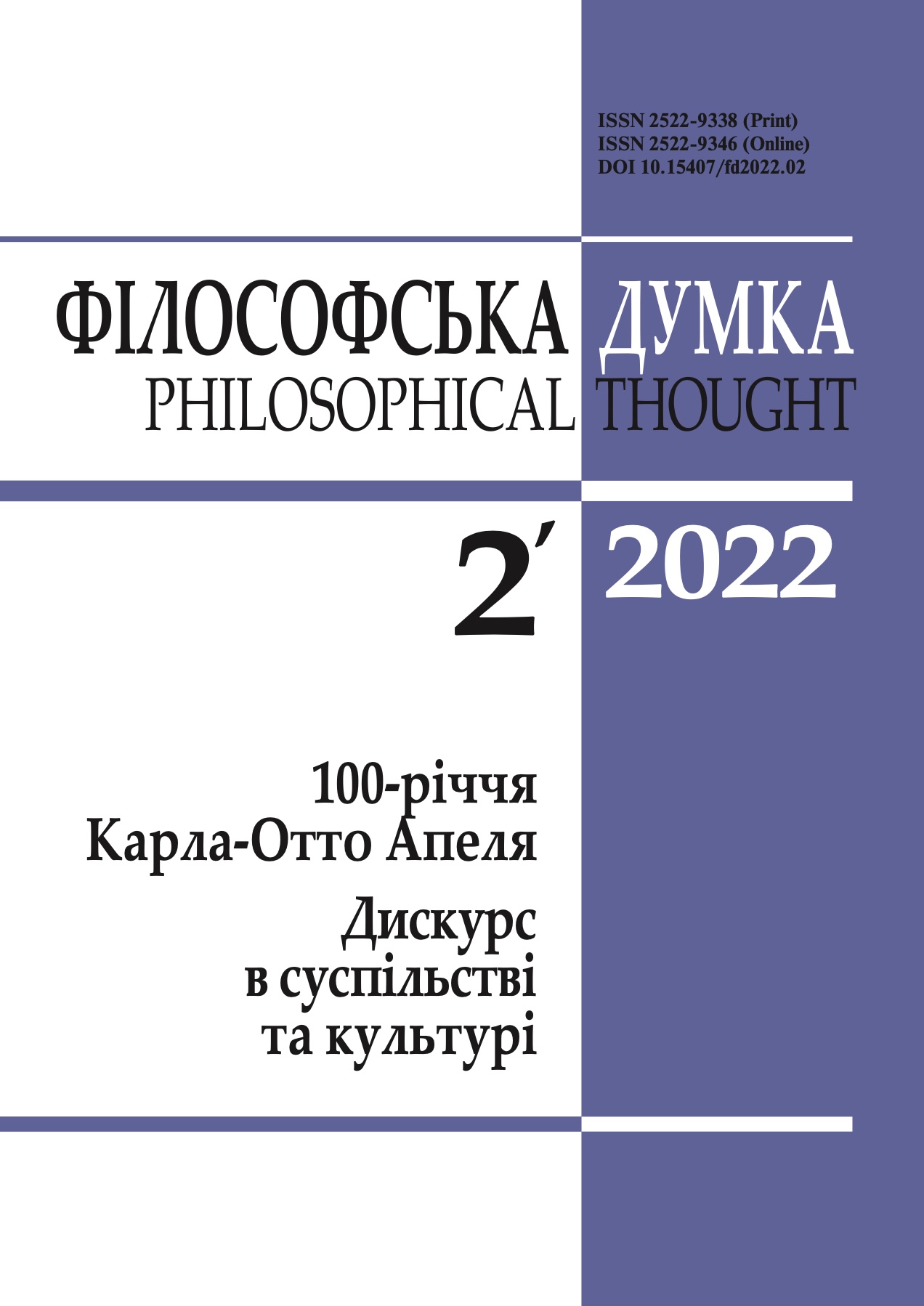KARL-OTTO APEL: THE ART OF LIVING IN THE MODUS OF THE DISCOURSE ETHICS
Keywords:
K.-O. Apel, the art of living, discourse ethics, philosophy of language, everyday life, war, experience, reeducation, intersubjectivity, coresponsibilityAbstract
The article proposes an attempt to reconstruct some fragments of the intellectual biography of K.-O, Apel on remembrance materials on of his near communicative circle and author’s narra- tive interviews with K.-O. Apel and his wife. The connection of Apel’s philosophical ideas and life events is reflected implicit also in his “Kyiv lectures” (1999). This empirical material is using to show influence of Apel’s life experience on the development direction of his basic philosoph- ical ideas, especially of discourse ethics. The practices of the self-control, self-observing and self-description belong to Apel’s livelong self-education. His worldview position was founded on the synthesis of Protestantism ethical principles and Catholic aesthetic in their secular transformation, what was cultivating in his life projects. The principle of the responsibility ethics is con- cretizing by Apel in distinction of self-responsibility and co-responsibility what was maintaining in his life-world. Convincing and persuading were his pedagogical instruments using both on his own children and students in educational practices. Apel’s war experiences are very important as learning in extremely conditions. They might be considered also as the important contribution to his turning to discourse ethics. Apel’s being as a prisoner of the war with following practices of reeducation and denazification are regarded also in the perspective of the discourse ethics. The democratically version of this practices has given an impulse for Apel’s turning to American language philosophy and its critically reception. Apel’s following descriptions of the German moral disaster with its roots and searching for ways to prevail upon this situations have aimed to unveil the hidden resources of the post-conventional morality and to prove the possibility of the post-conventional patriotism as the consensus oriented strategy of the contemporary world politics founding on humanism and co-responsibility for future of mankind.
References
Adorno, Th.W. (1964). Jargon der Eigentlichkeit. Zur deutschen Ideologie. Frankfurt a.M.: Suhrkamp.
Apel, K.-O. (1999). Kyiv lectures / Trans. from German by M.D. Kultaieva. [In Russisn]. Кyiv: Stilos.
Apel, K.-O. (2000). Deutsche Nachkriegsphilosophie- Männlichkeit und Männerbünde. Phi lo- sophischer Forum für feministische Theorie und Philosophie, 11 (22), 101—121.
Apel, K.-O. (2016). Zurück zur Normalität — Oder können wir aus der nationalen Katastrophe etwas Besonderes gelernt haben? In: Diskurs und Verantwortung. Das Problem des Übergangs zur postkonventionellen Moral (SS. 306—369). S.l.
Apel, K.-O. (2022). My Intellectual Biography in the Context of Contemporary philosophy. In: K.-O. Apel, Auf der Suche nach dem letzten Grund / Hrsg. R. Hesse (SS. 91—130). Münster: Lit.
Apel, D. (2020). In Erinnerung an meinen Vater. Ergänzung eines autobiographischen Berichtes. Disputatio. Philosophical Research Bulletin, 9 (12), 355—380.
Czasny, K. (2020). Das bedrohte Subjekt. Beiträge zur pragmatistischen Transzendentalphilosophie. Baden-Baden: Akademie Verlag.
Fichte, J.G. Briefe. Lepzig: Reclam.
Gadamer, H.G. (1972). Kleine Schriften. Tübingen: Mohr.
Hösle, V. (2022). Erinnerungen an Gespräche mit Karl-Otto Apel. In: Karl-Otto Apel Vita e Pen-
siere. Leben und Denken. Cosenza, Peligrini Editae.
Kultaieva, M. (2018). Philosophy of Education of the Third Reich: Origin, political and Ideolo-
gical Contexts and Conceptual Constructions. [In Ukrainian]. Filosofia osvity. Philosophy
of Education, 1 (23), 32—69.
Radionova, N. (2008). Representations of Philosophy in the Education Space of Sloboshanshchina in the XIX century. [In Ukrainian]. Sumy: Kozatskyi val.
Schmitt, K. (1960). Die Tyrannei der Werte. Stuttgart: Kohlhammer.
Thomä, D., Kaufmann, V., Schmid, U. (2015). Der Einfall des Lebens. Theorie als geheime Autobiographie. München: Carl Hanser Verlag
Werner, M.H. (2001). Die Verantwortungsethik Karl-Otto Apels. Würdigung uns Diskussion. In: Prinzip der Mitverantwortung. Grundlage von Ethik und Pädagogik. (SS. 123—134). Würzburg.
Yermolenko, A. (2019). Karl-Otto Apel’s Discourse Ethics as Applied Ethics of Responsibility
for Ukrainian Society. In: Topologik, 24, 248—256.
Downloads
-
PDF (Українська)
Downloads: 272
Published
How to Cite
Issue
Section
License
Authors who publish with this journal agree to the following terms:
- Authors retain copyright and grant the journal right of first publication.
- Authors are able to enter into separate, additional contractual arrangements for the non-exclusive distribution of the journal's published version of the work (e.g., post it to an institutional repository or publish it in a book), with an acknowledgement of its initial publication in this journal.
- Authors are permitted and encouraged to post their work online (e.g., in institutional repositories or on their website) prior to and during the submission process, as it can lead to productive exchanges, as well as earlier and greater citation of published work (See The Effect of Open Access).


